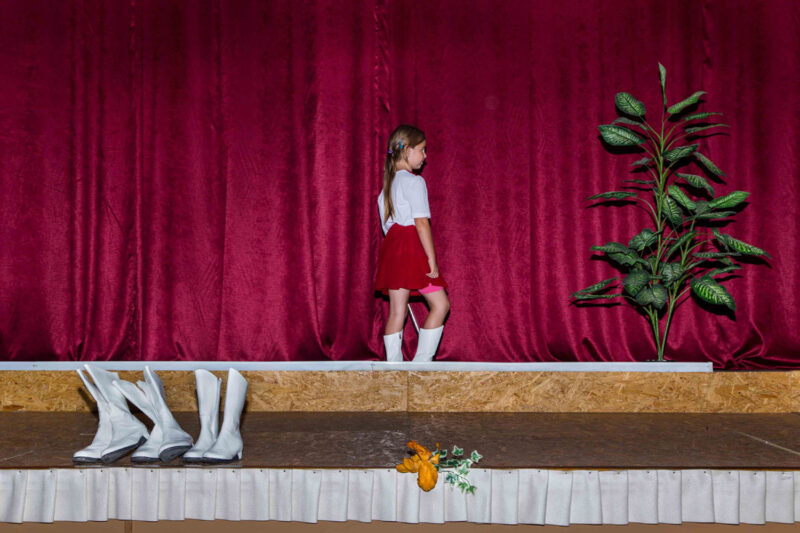Monday, December 4 at 6:30 PM
The Graduate Center, CUNY
Room 6112 (Sociology Lounge)

Photo credit: Sára Tímár: József Attila House of Culture, Rudolftelep, 2016, Culture House 2015-2017
The Cultural Politics of Authoritarian Statism in Hungary
In recent years, we have witnessed a global rise of authoritarian state projects from Turkey to Eastern Europe. These regimes are credited as the hotbeds of “culture wars,” but we know little about their on the field operation of actual cultural politics. Kristóf Nagy and Márton Szarvas will each give a presentation to engage with the history and everyday operation of cultural institutions of emerging right wing hegemonic projects. Based on the combination of ethnographic methods and policy studies, Kristóf Nagy will speak about an institution responsible for elite culture and cultural elites and Márton Szarvas will speak on a cultural infrastructure that is engaged with national popular culture. Joscelyn Jurich will join them in discussion and Mary N. Taylor will moderate.
Focusing on Hungary, a forerunner of the global rise of the right, Nagy will present on Art Making as State Making: Elite Culture and Hegemony through the Case of Contemporary Hungary. To understand what happens within the cultural institutions of authoritarian regimes, Nagy will draw on his year-long ethnographic research at the Hungarian Academy of Arts, the cultural flagship institution of the regime of Viktor Orbán. By adopting a perspective from the belly of the beast, the talk will touch on but not stop at analyzing research in hostile environments. For this purpose, the presentation stresses that global and historical aspects should be considered to understand right-wing regimes and their cultural institutions. First, it argues that the reinvigorated attempt to craft a national culture is not a degeneration but the result of the escalating global competition between nation-states. Second, it argues that right-wing regimes do not create their cultural apparatus from scratch. Instead, they can mobilize decades-long local traditions of nation-oriented cultural production.
Szarvas will contribute on the topic Challenge or Reproduction: Cultural Politics in the House of Culture, chronicling the contemporary transformation of the most widespread cultural institution in Hungary and in Eastern Europe, the house of culture. Activities organized in the place are called civic cultivation (közművelődés). This assemblage of educational activities, typically organized by modern states within different cultural institutions to form citizens and labor through moral education and disseminating knowledge about institutional culture and a modern way of life. Szarvas will speak about transformations on different scales, from the central governing institutions of cultural policy, to the individual institutions. He will inquire how policies and politics are transformed during these translations by local cultural elites; what effects these translations have on localized forms of middle class placemaking and on the operation of the conservative authoritarian regime.
Kristóf Nagy is a Budapest-based researcher of art, culture, and society. He was trained at The Courtauld Institute of Art, and is now finishing his Ph.D. at the Central European University in the Department of Sociology and Social Anthropology. His dissertation project examines the cultural politics of the Orbán regime via an ethnography of the Hungarian Academy of Arts. He serves as an editor of the social theory journal Fordulat, and is a member of the Helyzet Working Group for Public Sociology. He is also affiliated with the Central European Research Institute for Art History and the Eötvös Loránd University.
Márton Szarvas is an assistant professor at the Moholy-Nagy University of Art and Design. He holds a Ph.D. in Sociology and Social Anthropology from the Central European University, Budapest. His dissertation interrogated the changing relationship between state, civil society, and culture in contemporary Hungary in rural houses of culture. He is a member of the Working Group for Public Sociology “Helyzet” and a founding member of the Solidarity Economy Center, Budapest.
Joscelyn Jurich is a researcher and lecturer in Media Studies at NYU. Her research addresses global visual culture in conflict and post-conflict contexts and probes the relationships between artistic and political praxis, narrative re-formation and the potential of cultural production as socio-political and media critique. She co-authored “Systematic Suppression: Hungary’s Arts & Culture in Crisis” (2022), a report issued by Artistic Freedom Initiative, an organization that connects international artists at risk with pro bono immigration. Her writing on the visual arts has appeared in the Journal of Visual Culture, Studies in Documentary Film, Afterimage, and in Performing Human Rights: Contested Amnesia and Aesthetic Practices in the Global South (2021).
Mary N. Taylor is a multimodal anthropologist and the assistant director of the Center for Place, Culture and Politics at the Graduate Center, CUNY. Recent publications include Movement of the People: Hungarian Folk Dance, Populism and Citizenship (Indiana University Press 2021) and The Commonist Horizon: Urban Futures beyond Capitalism (Common Notions, 2023). She is a member of the LeftEast collective.
This event is organized and sponsored by the Center for Place, Culture and Politics at the CUNY Graduate Center. It is free and open to the public.



